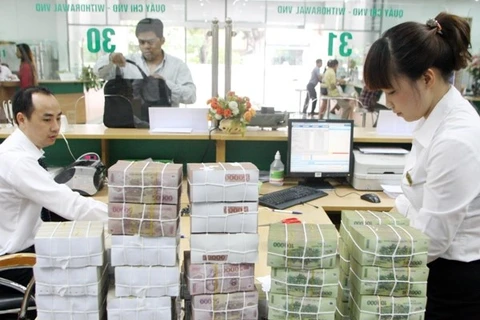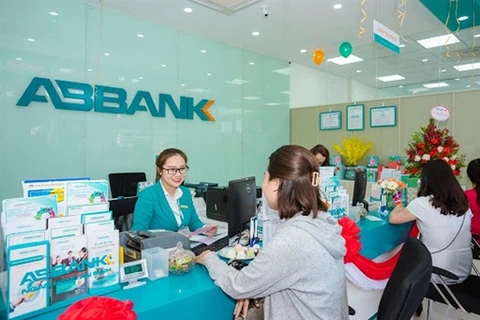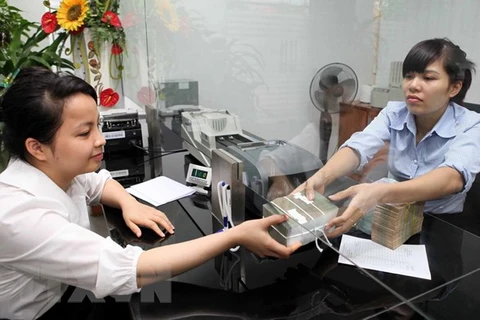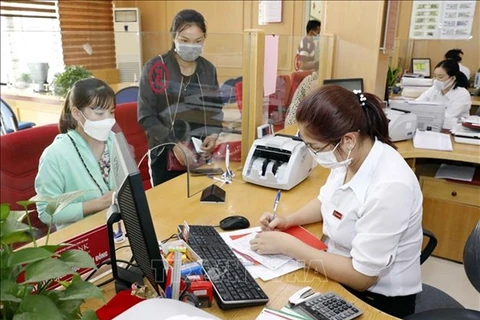Hanoi (VNA) – The State Bank of Vietnam (SBV)’s decision to increase credit room by 1.5%-2% fits Vietnam’s current financial situation, helping ease inflationary pressure, interest rates and exchange rates, according to experts.
With the increase, about 200 trillion VND (8.49 billion USD) will be pumped into the economy, which is a good news for many banks.
Experts say the SBV’s move during peak season provides for some flexibility in production to prepare for the Lunar New Year (Tet) holiday. It helps increase business access to capital provided they meet strict credit conditions. Besides, the current macro-economic situation context is also favorable for the decision.
Tran Duc Anh from KB Securities Vietnam said that commodities prices such as gasoline, iron and steel as well as cattle and poultry have all cooled compared to those in a few months ago, so inflation pressure is also lower than before.
He cited statistics from the General Statistics Office showing that in the first 11 months of 2022, the consumer price index (CPI) increased 3.02% over the same period last year, while the core inflation rose 2.38%. This result showed that the target of controlling CPI below 4% is almost certainly within reach.
Experts estimate that in the context of a fluctuating global economy, keeping the CPI under 4% in 2022 shows a determined Government. Meanwhile, the VND/USD exchange rate has fallen sharply.
Vo Tri Thanh, member of the National Financial and Monetary Policy Advisory Council (NFMPAC) said that the recent decision to revise up the 2022 credit growth target of the banking system reflects efforts to ensure macro-economic stability. It also reveals the spirit of flexibility at the same time as pressures from interest rates and exchange rates have eased, and banking system liquidity has improved.
From the view of commercial banks, Nguyen Thanh Tung, Deputy General Director of Vietcombank said that Vietcombank's remaining credit room is about 20 trillion VND (850 million USD).
Under the new policy, BIDV has been allowed to lend an additional 27 trillion VND, while the amount for Vietcombank is 5 trillion VND.
Can Van Luc, member of the NFMPAC advised credit institutions to actively balance mobilised capital sources, ensure liquidity, credit quality and efficiency of credit. In addition, the Ministry of Finance should strongly open the capital channel from corporate bonds, he added.
According to Luc, ministries, sectors and localities should promptly and effectively accelerate public investment capital and speed up national target programmes. They should also hasten the socio-economic recovery programme for the 2022-2023 period in order to reduce pressure on demand for bank credit capital. The move would also help to reduce debts on capital tightening among businesses, thus creating a driving force for immediate and long-term growth.
Commenting on the performance of the economy in 2023, Luc said he believes that inflation is still under control at 4%-4.5%. The pressure on liquidity with the credit institution system will be eased, prompting people to deposit money in banks. In addition, pressure on interest rates and exchange rates will decrease in the context that many central banks, including the Fed, have gradually reduced the speed of interest rate hikes.
The Fed may also stop raising interest rates at the beginning of the second quarter of next year, or it may consider the reduction of the interest rates by the end of 2023.
SBV leaders said that in the coming time, the bank will keep a close eye on forecasts and the overall situation, especially inflation to develop directional targets and solutions for monetary and credit management./.
























